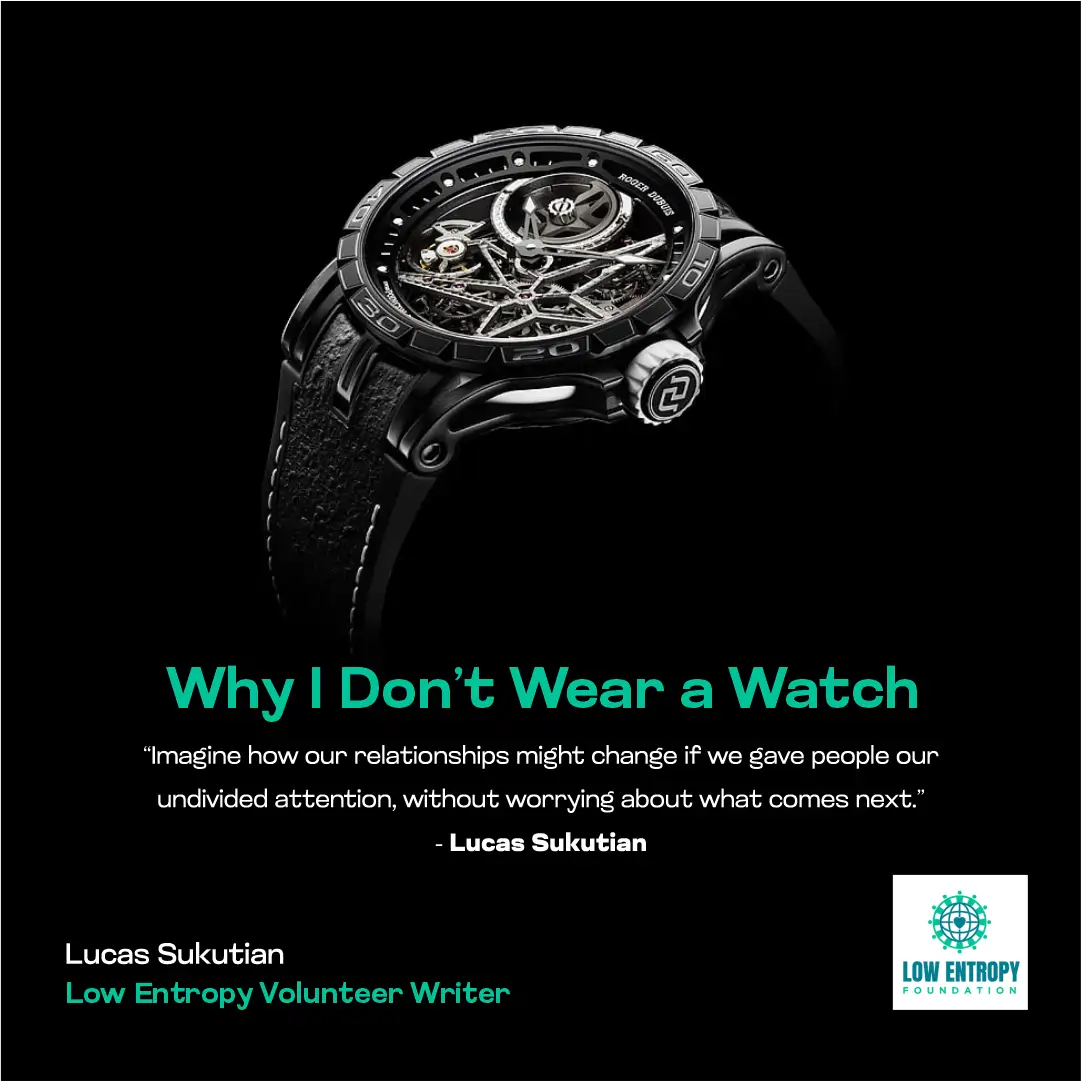Lucas Sukutian, Low Entropy Volunteer Writer
I wear a watch, but not in the way you might think. For me, it’s not just a tool for tracking minutes and hours—it’s a reminder of how we choose to relate to time. The title of this article is not about rejecting watches or timekeeping altogether; it’s about questioning the way we allow time to shape our lives.
We live in a world where time often feels like a tyrant. Schedules, deadlines and reminders structure our days, and we’re constantly aware of the ticking clock. We measure success by how much we can accomplish in a given timeframe, and we often feel guilty when we’re not doing something productive. In this race against time, we can lose sight of the present moment—the one thing we actually have.
I started reflecting on my relationship with time when I noticed how much anxiety it could create. I would check my watch frequently, worried about being late or not having enough time to finish what I had planned. It wasn’t the watch itself that was the problem; it was the mindset it represented. I had begun to see time as something to manage, conquer or control, rather than something to experience and appreciate.
When I say I don’t wear a watch, what I really mean is that I’ve learned to look at time differently. I’ve stopped seeing it as a countdown and started viewing it as a rhythm. Instead of rigidly structuring my days around the clock, I try to pay attention to the natural flow of energy, emotion and connection. Some moments call for action and focus, while others invite rest and reflection. When we honor these rhythms, we often find that time feels more abundant, rather than scarce.
There’s a certain illusion of control that comes with constantly monitoring time. We think that if we can just organize our schedules perfectly, we can avoid uncertainty and chaos. But life doesn’t work that way. Plans change, interruptions happen and opportunities sometimes appear when we least expect them. By loosening my grip on time, I’ve learned to be more flexible and present. Instead of seeing disruptions as obstacles, I’ve come to see them as opportunities—an unexpected conversation, a chance to help someone or even just a moment to breathe.
The truth is, being busy isn’t the same as being present. We can fill our days with tasks and still feel disconnected from ourselves and others. Wearing a watch, in the literal sense, has never been the issue—it’s the symbolic weight we give it. When we constantly check the time, we can forget to check in with how we’re feeling or what we truly need. We can miss the beauty in a conversation, the stillness of a quiet morning or the joy of simply being.
I believe time is one of the most valuable resources we have, not because it’s limited, but because it’s an opportunity. It’s something we can share—with loved ones, with our communities and with ourselves. Instead of guarding it fiercely or measuring it obsessively, what if we treated it as a gift? Imagine how our relationships might change if we gave people our undivided attention, without worrying about what comes next. Imagine how our communities could grow if we used our time to support one another, to listen, to care and to build something lasting.
This mindset reflects the values of compassion, empathy and interconnectedness. It reminds us that time isn’t just a personal asset, but a shared one. When we give our time to others, we’re not losing it; we’re investing it in something greater than ourselves.
So no, I haven’t stopped wearing a watch. But I have stopped letting it rule my life. I’ve stopped measuring my worth by how much I get done in a day and I’ve started valuing the quality of the moments I experience. Whether it’s a deep conversation, a walk in nature or a quiet pause between activities, I’m learning that the most meaningful parts of life often happen when we stop looking at the clock.
Time is a paradox—it’s both finite and infinite. We can’t control it, but we can shape the way we move through it. My hope is that we all learn to spend our time with more intention, more presence and more care. Because at the end of the day, it’s not about how much time we have—it’s about how we use it to create moments that truly matter.
—
Lucas Sukutian, an economics professional from Toronto, blends his love for research with a passion for animals, books and good food. Beyond academics, he values human connections and proclaims tennis as the ultimate sport.


Good idea!
I don’t like watches though I often wear a traditional one since it is pretty and I treat it as jewlery. What bothers me about all watches is that they are organizers. I don’t want someone or something to organize me. There are enough organizational elements in the world beside that portable thing on my wrist. A watch is an administrative tool, just another boss but with the advantage being you can leave the D_ _ _ _ thing at home, just like you can leave your boss at work.